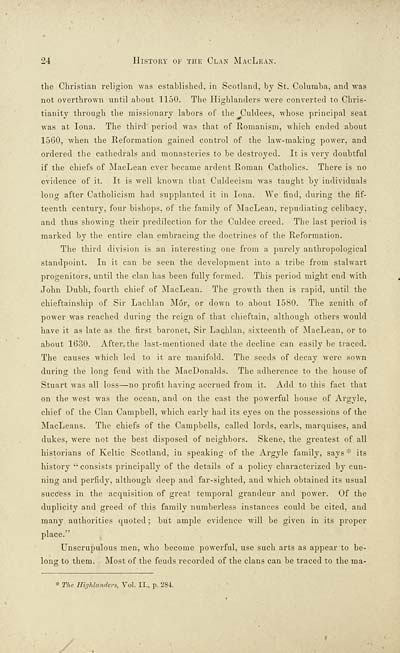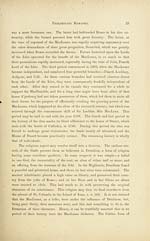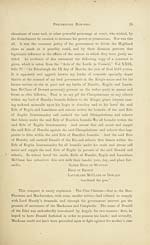History of the Clan MacLean from its first settlement at Duard Castle, in the Isle of Mull, to the present period
(30) Page 24
Download files
Complete book:
Individual page:
Thumbnail gallery: Grid view | List view

24 History ov tue Clan MacLean.
the Cliristian religion was established, in Scotland, by St. Columba, and was
not overthrown until about 1150. The Highlanders were converted to Chris-
tianity through the missionary labors of the Culdees, whose principal seat
was at lona. The third period was that of Romanism, which ended about
1560, wheii the Reformation gained control of the law-making power, and
ordered tiie cathedrals and monasteries to be destroyed. It is very doubtful
if the chiefs of MacLean ever became ardent Roman Catholics. There is no
evidence of it. It is well known that Culdeeism was taught by individuals
long after Catholicism had supplanted it in lona. We find, during the fif-
teenth centur}', four bishops, of the family of MacLean, repudiating celibacy,
and thus showing their predilection for the Culdee creed. The last period is ■
marked by the entire clan embracing the doctrines of the Reformation.
The third division is an interesting one from a purely anthropological
standpoint. In it can be seen the development into a tribe from stalwart
progenitors, until the clan has been fully formed. This period might end with
John Dubh, fourth chief of MacLean. The growth then is rapid, until the
chieftainship of Sir Lachlan jMor, or down to about 1580. Tiie zenith of
power was reached during the reign of that chieftain, although others would
have it as late as the first baronet, Sir Lachlan, sixteenth of MacLean, or to
about 1630. After, the last-mentioned date the decline can easily he traced.
The causes which led to it are manifold. The seeds of decay were sown
during the long feud with the MacDonalds. The adherence to the house of
Stuart was all loss — no profit having accrued from it. Add to this fact that
on the west was the ocean, and on the east the powerful house of Argyle,
chief of the Clan Campbell, which early had its ejes on the possessions of the
MacLeans. The chiefs of the Campbells, called lords, earls, marquises, and
dukes, were not the best disposed of neighbors. Skene, the greatest of all
historians of Keltic Scotland, in speaking of the Argyle family, says * its
history "consists principally of the details of a policy characterized by cun-
ning and perfidy, although deep and far-sighted, and which obtained its usual
success in the acquisition of great temporal grandeur and power. Of the
duplicity and greed of this familj'^ numberless instances could be cited, and
many authorities quoted ; but ample evidence will be given in its proper
place."
Unscrupulous men, who become powerful, use such arts as appear to be-
long to them. Most of the feuds recorded of the clans can be traced to the ma-
» The Highlanders, Vol. II., p. 284.
the Cliristian religion was established, in Scotland, by St. Columba, and was
not overthrown until about 1150. The Highlanders were converted to Chris-
tianity through the missionary labors of the Culdees, whose principal seat
was at lona. The third period was that of Romanism, which ended about
1560, wheii the Reformation gained control of the law-making power, and
ordered tiie cathedrals and monasteries to be destroyed. It is very doubtful
if the chiefs of MacLean ever became ardent Roman Catholics. There is no
evidence of it. It is well known that Culdeeism was taught by individuals
long after Catholicism had supplanted it in lona. We find, during the fif-
teenth centur}', four bishops, of the family of MacLean, repudiating celibacy,
and thus showing their predilection for the Culdee creed. The last period is ■
marked by the entire clan embracing the doctrines of the Reformation.
The third division is an interesting one from a purely anthropological
standpoint. In it can be seen the development into a tribe from stalwart
progenitors, until the clan has been fully formed. This period might end with
John Dubh, fourth chief of MacLean. The growth then is rapid, until the
chieftainship of Sir Lachlan jMor, or down to about 1580. Tiie zenith of
power was reached during the reign of that chieftain, although others would
have it as late as the first baronet, Sir Lachlan, sixteenth of MacLean, or to
about 1630. After, the last-mentioned date the decline can easily he traced.
The causes which led to it are manifold. The seeds of decay were sown
during the long feud with the MacDonalds. The adherence to the house of
Stuart was all loss — no profit having accrued from it. Add to this fact that
on the west was the ocean, and on the east the powerful house of Argyle,
chief of the Clan Campbell, which early had its ejes on the possessions of the
MacLeans. The chiefs of the Campbells, called lords, earls, marquises, and
dukes, were not the best disposed of neighbors. Skene, the greatest of all
historians of Keltic Scotland, in speaking of the Argyle family, says * its
history "consists principally of the details of a policy characterized by cun-
ning and perfidy, although deep and far-sighted, and which obtained its usual
success in the acquisition of great temporal grandeur and power. Of the
duplicity and greed of this familj'^ numberless instances could be cited, and
many authorities quoted ; but ample evidence will be given in its proper
place."
Unscrupulous men, who become powerful, use such arts as appear to be-
long to them. Most of the feuds recorded of the clans can be traced to the ma-
» The Highlanders, Vol. II., p. 284.
Set display mode to:
![]() Universal Viewer |
Universal Viewer | ![]() Mirador |
Large image | Transcription
Mirador |
Large image | Transcription
Images and transcriptions on this page, including medium image downloads, may be used under the Creative Commons Attribution 4.0 International Licence unless otherwise stated. ![]()
| Histories of Scottish families > History of the Clan MacLean from its first settlement at Duard Castle, in the Isle of Mull, to the present period > (30) Page 24 |
|---|
| Permanent URL | https://digital.nls.uk/94802243 |
|---|
| Description | A selection of almost 400 printed items relating to the history of Scottish families, mostly dating from the 19th and early 20th centuries. Includes memoirs, genealogies and clan histories, with a few produced by emigrant families. The earliest family history goes back to AD 916. |
|---|

